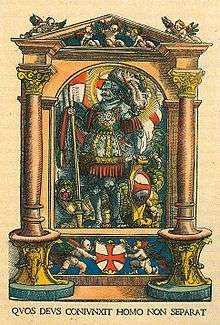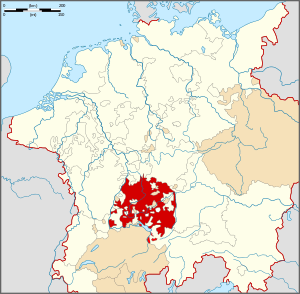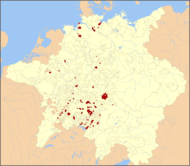Biberach an der Riss
| Biberach an der Riss | ||
|---|---|---|
|
Market and the tower of St. Martin's Church | ||
| ||
 Biberach an der Riss | ||
Location of Biberach an der Riss within Biberach district 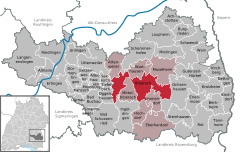
 | ||
| Coordinates: 48°6′N 9°47′E / 48.100°N 9.783°ECoordinates: 48°6′N 9°47′E / 48.100°N 9.783°E | ||
| Country | Germany | |
| State | Baden-Württemberg | |
| Admin. region | Tübingen | |
| District | Biberach | |
| Government | ||
| • Lord Mayor | Norbert Zeidler (since 2013) (no party member) | |
| Area | ||
| • Total | 72.16 km2 (27.86 sq mi) | |
| Population (2015-12-31)[1] | ||
| • Total | 32,233 | |
| • Density | 450/km2 (1,200/sq mi) | |
| Time zone | CET/CEST (UTC+1/+2) | |
| Postal codes | 88400 | |
| Dialling codes | 07351 | |
| Vehicle registration | BC | |
| Website | www.biberach-riss.de | |
Biberach is a town in the south of Germany. It is the capital of Biberach district, in the Upper Swabia region of the German state (Land) of Baden-Württemberg. To distinguish it from the other towns of the same name it is called Biberach an der Riss (German: Biberach an der Riß) after the small river Riss which flows through the city (the Riss also gave its name to the Riss glaciation period).
Geography
Biberach has a population of about 32,000, and is located in Upper Swabia between the river Danube and Lake Constance.
The districts of Biberach comprise the inner city (with the quarters Bachlangen, Bergerhausen, Birkendorf, Burren, Fünf Linden, Gaisental, Hagenbuch, Jordanbad, Mumpfental, Reichenbach and Wolfentalmühle) and its suburban, integrated villages Rissegg, Rindenmoos, Ringschnait, Stafflangen and Mettenberg.
History
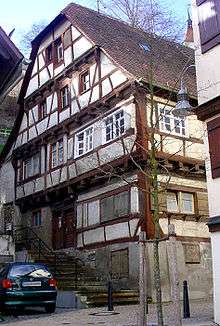

| Mixed Imperial City of Biberach an der Riss | ||||||||||
| Paritätische Reichsstadt Biberach an der Riß | ||||||||||
| Free Imperial City of the Holy Roman Empire | ||||||||||
| ||||||||||
| Capital | Biberach an der Riss | |||||||||
| Languages | Alemannic | |||||||||
| Government | Republic | |||||||||
| Historical era | Middle Ages | |||||||||
| • | City founded | before 1083 | ||||||||
| • | Gained Reichsfreiheit | 1281 | ||||||||
| • | Peace of Augsburg | September 25, 1555 | ||||||||
| • | Thirty Years' War | 1618–48 | ||||||||
| • | Peace of Westphalia | 1648 | ||||||||
| • | Mediatised to Baden | 1803 | ||||||||
| • | Exchanged with Württemberg for Villingen | 1805 | ||||||||
| ||||||||||
For many centuries, Biberach was an Imperial Free City (German: Freie Reichsstadt) in the Holy Roman Empire. In that role it participated in the 1792 Reichstag.
During the Protestant Reformation, Biberach was notable for being — eventually along only with Ravensburg, Augsburg and Dinkelsbühl — a "Mixed Imperial City" (German: Paritätische Reichsstadt) where the Peace of Westphalia caused the establishment of a joint Catholic–Protestant government and administrative system, with equality offices (German: Gleichberechtigung) and a precise and equal distribution between Catholic and Protestant civic officials. This status ended in 1803, when Biberach was annexed by the Margraviate of Baden, soon to become a grand-duchy. In 1806, it was traded to the Kingdom of Württemberg in exchange for the town of Villingen; becoming part of the German Empire on its creation in 1871.
During the French Revolutionary Wars, Biberach and its environs were the site of two sizable battles in 1796 and 1800.
During World War II, two large prisoner-of-war camps were located here, with Oflag V-B for officers, and internment camp Ilag V-B for allied civilians, mainly from the Channel Islands.
Economy
With a rather low unemployment rate of around 3.6% and place of business of companies like EnBW, Handtmann, Liebherr, KaVo Dental GmbH, and Boehringer Ingelheim, Biberach is a significant industrial location in the southwest of Germany.
- KaVo
KaVo (Kaltenbach & Voigt) is a leading company in producing dental medicine equipment and products like instruments, dental systems, laboratory and equipment for training centers for universities. The head office is in Biberach. But KaVo has production locations and sales locations all over the world, e.g. in Brazil, England, USA, Canada, Russia, France, Italy, etc. In March 2004, Danaher, an American industrial company, took over KaVo.
- Boehringer Ingelheim
Boehringer Ingelheim researches, develops, and produces drugs. With about 35,529 employees who are employed in 156 countries on all continents, today, Boehringer Ingelheim is part of the most research intensive enterprises internationally. Boehringer Ingelheim was founded in Ingelheim am Rhein, Germany, in 1885, where the corporate headquarters are located. There are about 4,500 employees in Biberach.
- EnBW
EnBW means "Energy Baden-Württemberg". Its corporate center is in Karlsruhe. In Stuttgart there is the "Regional Center". EnBW is Germany's third largest energy company. In Biberach there are about 900 employees. The firm employs 125 trainees.
- Liebherr Biberach
The beginning of Liebherr Biberach was in 1954. The firm produces many sorts of cranes. 1,700 people and 112 trainees work there. The group's founder, Dr. Hans Liebherr, invented the mobile tower crane in 1949 in Kirchdorf/Iller.[2]
Culture and entertainment
Cafes, clubs, restaurants
There are many cafés and beer gardens in Biberach.
Museums
- Braith-Mali-Museum: The museum resides in a building from the 16th century and presents on 2,800 square meters archaeology, history, art and natural history.
- Wieland-Museum: The exhibition explores the life and work of Christoph Martin Wieland. The museum was founded in 1907 and resides in the summer house of Wieland.[3]
Film festival
Biberach has a film fest for German films which celebrated its 31st anniversary in 2009.[4]
"Biberacher Schützenfest"
The Biberacher Schützenfest is a historic festival for children and the town. The event starts every year in the first week of July and lasts nine days. The name "Schützenfest" derives from the German noun Schütze, meaning marksman. But nowadays, the crossbow competition and the appraisal of the best male and female champion shot (Schützenkönig and -königin) are only small events during the week of the Schützenfest. Other attractions and events during the festival are:
- Street parades
- Fairgrounds
- Historical performances
- Theme park
- Parties in bars, cafès and so on
- Beer tent
- Children's theater (Schützentheater)
Christmas Market
The annual Christmas market, called "Christkindlesmarkt", which lasts 16 days, is another highlight of the year. Exotic foods from Britain, France, and Italy (presented by the twin cities), kitsch, and beautiful arts and crafts are there to see and buy. People meet to drink mulled wine.
Music
The church music in Biberach is specially determined by the St.-Martins-Chorknaben Biberach (English: St Martin’s Boys’ Choir Biberach).
Other events in Biberach
- Musiknacht
- Musikfrühling
- Kabarettherbst
Sports in Biberach
TG Biberach 1847 e. V. is one of the biggest clubs in the region. It has more than 6,000 members and 27 divisions including American football, tennis, chess or volleyball.
IBOT Another important sports festival in Biberach is IBOT, an annual international handball tournament for youth with more than a thousand participants which takes place at Easter.
Famous people

- Matthias Erzberger, German politician (1875-1921) is buried here
- Alf Bayrle, German painter and printmaker (1900-1982) was born here
- Anton Braith, German painter of animals (1836-1905), was born and died here
- Loris Karius, Liverpool F.C. goalkeeper (1993-), was born here
- Dirk Raudies, Grand prix driver, (1964-),was born here
- Harry Baer (1947), actor, producer, author
- Georg Friedrich Dinglinger (1666–1720), enameller at the court of Augustus II the Strong in Dresden
- Johann Melchior Dinglinger (1664–1731), jeweller at the court of Augustus II the Strong in Dresden
- Steffen Deibler (born 1987), swimmer
- Markus Deibler (born 1990), swimmer
- Eberhard Emminger (1808–1885), litographer
- Hugo Häring (1882–1958), architect
- Justin Heinrich Knecht (1752–1817), composer, organ player, conductor
- Anton Kutter (1903–1985), regisseur and telescop constructor
Twin towns – sister cities
Biberach is twinned with five cities. It also has close links to Guernsey, one of the Channel Islands.
 Asti, Italy
Asti, Italy Valence, France
Valence, France Telavi, Georgia
Telavi, Georgia Clacton-on-Sea, Essex, England, United Kingdom
Clacton-on-Sea, Essex, England, United Kingdom Świdnica, Poland
Świdnica, Poland
See also
References
- ↑ "Gemeinden in Deutschland nach Fläche, Bevölkerung und Postleitzahl am 30.09.2016". Statistisches Bundesamt (in German). 2016.
- ↑ "Hans Liebherr - Entrepreneur, inventor, visionary". Liebherr Group. Retrieved 18 August, 2015.
- ↑ Museum website (German)
- ↑ Biberacher Filmfestspiele
External links
| Wikimedia Commons has media related to Biberach an der Riß. |
- Information from city hall
- Biberach Riss - Interactive discovery
- The "Szenefuehrer" - a guide to pubs, bars, restaurants, etc. for students in Biberach (English version pending)

